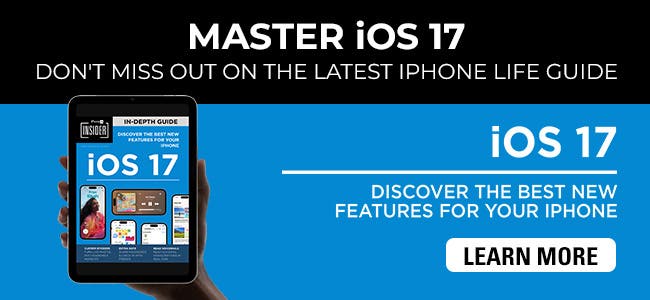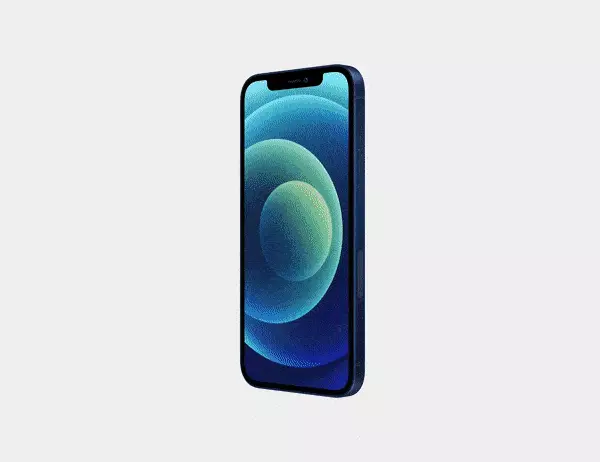Verizon…what a beautiful name. It sounds so much nicer than American Telephone and Telegraph… much more modern. I did a bit of checking and though telegram service is still available in the US through iTelegram, AT&T exited the telegraph business back in 1991. If they were still sending out telegrams, one like this might have been delivered last October:
October 20, 2010
Apple announces iPad to be in Verizon stores by end of October Stop

Verizon iPhone to follow sometime in early January 2011 Stop
The number one question we get here at iPhone Life magazine is, "So, when is Verizon getting the iPhone?" Well, as of October 28, the iPad is available at Verizon stores nationwide, and it looks like you won't have long to wait before the iPhone takes up residence too.
The attraction of Verizon
Verizon has a lot to offer Apple, not the least of which is its base of 90 million subscribers—a huge market for the iPhone and iPad. In addition, Verizon's 3G network is more extensive in the US than AT&T's (3gstore.com/coverage). A 2008 study (seekingalpha.com/article/117231) shows that 49 percent of Verizon's customers as opposed to 30 percent of AT&T's reported being very satisfied with their cellular service provider. This should translate into better customer satisfaction for Apple's mobile devices when they become available on Verizon's network. It might also mean that existing iPhone/AT&T users would be tempted to give Verizon a shot when it comes time to renew their contracts. However, tests conducted by PC World in early 2010 (pcworld.com/article/189592) indicated that Verizon's network was moderately slower than AT&T's. So, if you've got good coverage with AT&T, and you don't plan on going anywhere (though that does somewhat defeat the purpose of having a mobile phone), then sticking with them makes sense.
AT&T and Verizon use different networks.
AT&T and Verizon use different wireless technologies with their networks. Consequently, an iPhone designed for AT&T's network won't work on Verizon's, and vice versa. AT&T's network uses GSM (Global System for Mobile Communications) standards and TDMA (Time Division Multiplex Access) technology for transmitting data; Verizon's is based on CDMA (Code Division Multiple Access) technology. Both technologies have voice and data capability, but the protocols used to transmit are different. CDMA usage is around 500 million worldwide, while GSM is somewhere between 1.5 and 2.5 billion. Going with AT&T initially made sense from a worldwide perspective, but there are rumors that Verizon was their first choice, which speaks to the quality of its network.
According to industry analyst Ed Sutherland, "The ultimate outcome of the battle for dominance between these two competing cellular data transmission technologies may lie more in their history than their respective merits." CDMA was originally developed as a way of controlling torpedoes in pre-World War II America but it only became commercially available in 1995. Just two years prior, European carriers and manufacturers chose to support GSM which lead to its current global dominance. That being said, here are a few things that distinguish the two technologies from a user's perspective.
Advantages of CDMA (Verizon's technology of choice)
- Better US coverage, especially in rural areas.
- Call quality (fewer echoes, distortions, dropped calls).
- Low power requirements.
- Can accommodate more users per MHz of bandwidth.
Advantages of GSM (AT&T's technology of choice)
- Better worldwide coverage makes international roaming easy.
- Use of SIM (subscriber identity module) cards makes switching phones easier.
- Less signal deterioration inside buildings.
The Verizon iPad…

 Initially, Verizon is selling the Wi-Fi version of the iPad bundled with their MiFi 2200, a small wireless receiver that lets the iPad access Verizon's 3G data network.
Initially, Verizon is selling the Wi-Fi version of the iPad bundled with their MiFi 2200, a small wireless receiver that lets the iPad access Verizon's 3G data network.
Verizon will bundle the Wi-Fi version of the iPad with its MiFi wireless 3G receiver.
You can think of MiFi as a data-only cell phone that tethers with the iPad (and other mobile devices) via Wi-Fi. Pricing, which includes both the iPad and MiFi, is as follows: $630 for the 16 GB iPad, $730 for the 32 GB model, and $830 for 64 GB.
The bigger news here is that Verizon and Apple are now working together. This gives credence to the rumor, now claimed to be fact by Fortune magazine, that Verizon will be carrying the iPhone in early 2011. According to Fortune, "analysts estimate that Apple could sell 8 million to 9 million [Verizon iPhones] next year, compared with an estimated 22 million iPhones sold to date in the U.S."
Survival of the fittest
 Android has been on the rise recently. Currently, the biggest things Android smartphones have going for them is they aren't restricted to AT&T's network and Android has an open app store, as opposed to Apple's tightly and somewhat mercurially controlled App Store.
Android has been on the rise recently. Currently, the biggest things Android smartphones have going for them is they aren't restricted to AT&T's network and Android has an open app store, as opposed to Apple's tightly and somewhat mercurially controlled App Store.  According to new figures from Nielsen, "Android (32 percent) is now the most popular operating system among people who bought a smartphone in the past six months, while Blackberry RIM and Apple iOS (25 percent each) are in a statistical dead heat for second place among recent acquirers. Among all smartphone owners, Blackberry still holds the dominant share with 31 percent of the market, though its lead over Apple is declining. Twenty-eight percent of smartphone owners have Apple iPhones, compared to 19 percent who have Android devices." In addition, the number of titles in the Android app store has risen dramatically (though it's still nowhere near the size of Apple's App Store).
According to new figures from Nielsen, "Android (32 percent) is now the most popular operating system among people who bought a smartphone in the past six months, while Blackberry RIM and Apple iOS (25 percent each) are in a statistical dead heat for second place among recent acquirers. Among all smartphone owners, Blackberry still holds the dominant share with 31 percent of the market, though its lead over Apple is declining. Twenty-eight percent of smartphone owners have Apple iPhones, compared to 19 percent who have Android devices." In addition, the number of titles in the Android app store has risen dramatically (though it's still nowhere near the size of Apple's App Store).
iPhone 4, HTC Droid, Blackberry Torch, LG Quantum (Windows 7). Competition is available on multiple networks.
I t's important to note that many devices other than smartphones are now running on the Android platform.
t's important to note that many devices other than smartphones are now running on the Android platform.  In addition to over 50 smartphones, Android is running on televisions, automobiles, and appliances. Broad support of a platform generally translates into continued development and better products and service. This could eventually lead to a smartphone that will rival the iPhone in elegance and functionality.
In addition to over 50 smartphones, Android is running on televisions, automobiles, and appliances. Broad support of a platform generally translates into continued development and better products and service. This could eventually lead to a smartphone that will rival the iPhone in elegance and functionality.
It looks like Android will continue to provide healthy competition to the iPhone. On the other hand, the RIM Blackberry and smartphones based on Microsoft's new Windows Phone 7 OS are in for a bit of a turf war.
The future is wide open, but for now Apple is still king of the hill. And when Verizon introduces its iPhone, we'll have the perfect smartphone storm—the best phone, the best network, and the best app store.

